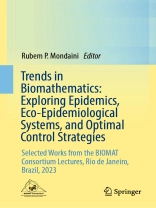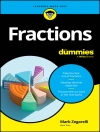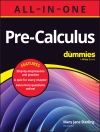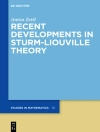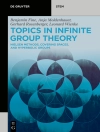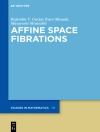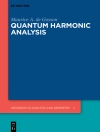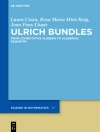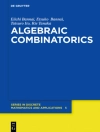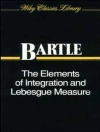This volume convenes carefully selected, peer-reviewed papers presented at the BIOMAT 2023 International Symposium, which was virtually held on November 6-9, 2023, with an organization staff based in Rio de Janeiro, Brazil.
In this volume, the reader will find studies on the epidemic model of the COVID-19 pandemic, aspects of risk-based testing and quarantine, as well as joint efforts in the search for the perfect vaccine. Additionally, the volume covers the influence of fear and the saturated fear cost in predator-prey dynamics, optimal control techniques applied to HPV infection and cervical cancer cells, generic epidemic models for disease propagation, discretized SIS model with no vertical transmission, dynamics of vibrio-phage interactions, and antibiotics treatment for septic arthritis.
Comprehensive Reviews are also included on the applications of CHIRP ultrasound for the mathematical modeling of evaporation of nanodroplets and on Alternative Entropy Measures and their application in the studies of distributions of discrete probabilities of occurrence. These works aim to motivate Ph.D. students and new practitioners in the field of Biomathematics.
Held every year since 2001, the BIOMAT International Symposium gathers together, in a single conference, researchers from Mathematics, Physics, Biology, and affine fields to foster the interdisciplinary exchange of results, ideas, and techniques, promoting truly international cooperation for problem discussion. BIOMAT volumes published from 2017 to 2022 are also available by Springer.
Inhaltsverzeichnis
Mathematical Modeling of the Vaporization of Encapsulated Perfluorocarbon Nanodroplets Using Chirp Ultrasound: A Review.- The Influence of Fear on Intraspecific Competition in Predator-Prey Dynamics: A model based study.- Dynamical study of a predator-prey interaction incorporating fear effect with saturated fear cost and prey refuge.- Optimal control of HPV infection and cervical cancer cells with Beddington–De Angelis functional response.- On the role of the basic reproduction number in systems modelling disease propagation.- On a discretized SIS epidemic model with no vertical transmission.- Computational Modeling of Viral Infection and Immune Response in Covid-19 Patients.- Complex Dynamics of an Eco-epidemiological System with Fear and Allee Effect.- Modeling the Dynamics of Vibrio-Phage Interactions: A Mathematical Approach.- Waiting for the Perfect Vaccine.- In silico modeling of antibiotics treatment combined with corticosteroids for septic arthritis.- Epidemic model for risk-based testing and quarantine.- Simple Case of Evolutionary Discrete Dynamics for Altruism with Reputation.- An exploration of the effects of periodic top predator interference and hunting on a predator-prey system.- Modeling the Effect of Disease Characteristics on the Outcomes of Interventions.- A Comprehensive Review of Sharma-Mittal Entropy Measures and their Usefulness in the Study of Discrete Probability Distributions in Mathematical Biology.
Über den Autor
Rubem P. Mondaini is President of the BIOMAT Consortium/International Institute for Interdisciplinary Mathematical and Biological Sciences and a Full Professor of Mathematical Biology and Biological Physics at the Federal University of Rio de Janeiro, Brazil. He holds a Ph D in Theoretical Physics from the Brazilian Centre for Physical Research, Brazil. His research activities abroad include a period as a Visiting Scientist at the International Centre for Theoretical Physics (ICTP), Trieste, Italy (1978) and as a Senior Postdoc at the Department of Mathematics of King’s College, University of London, UK (1986). He was also a Visiting Professor at the Centre of Physics of Condensed Matter, Lisbon, Portugal (1986) and at the Department of Chemical Engineering of Princeton University (2008). He has been the Chairman of the Annual BIOMAT Conferences since their inception during the BIOMAT 2001 Symposium in Rio de Janeiro, Brazil.
